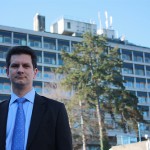
Today, I am calling on local NHS leaders to heed the clear call from the public in Wycombe to provide 24-hour emergency cover at Wycombe Hospital.
Councillor Tony Green’s petition to Bucks County Council has now passed the threshold to initiate a debate on the Emergency Medical Centre at Wycombe Hospital. The number of signatures has exceeded 5950. The petition calls on the Council’s Health Overview and Scrutiny Committee to inform the PCT that 24 hour, 7 days-a-week Emergency Medical Centre coverage is the minimum emergency service that is acceptable to the people of Wycombe.
We recognise that the hospitals in Buckinghamshire are under significant financial pressure and will need to change. What is important to us is that these changes are medically led and meet the needs of Buckinghamshire’s residents. The proposals are only at the consultation stage. It is important that we not only support them where appropriate but also set out our major concerns. These relate, for example, to ensuring the future viability of all the hospitals that serve Buckinghamshire and that a substantial Emergency Medical Care Unit is maintained at High Wycombe.
I have previously called for direct local ownership of Wycombe Hospital through some form of mutual society so that the public in Wycombe can have control over the health services for which we all pay. Today, even with the Government’s reforms, local control over health services is insufficiently direct. It is clear that anyone in Wycombe with an opinion wants 24 hour, 7 days-a-week emergency care at our hospital yet still all local people, councillors and members of Parliament can do is put pressure on the NHS. We can’t direct what happens on behalf of taxpayers and taxpayers have no control themselves.
I believe that must change.
I recently finished David G Green’s Working Class Patients and the Medical Establishment, which explores how self-help through mutual aid ensured the provision of health care before 1948. It provides 200 pages of clear evidence that working people were able to overcome problems of professional monopoly power and imbalances of knowledge to organise medical care through widespread membership of friendly societies. People governed themselves and doctors answered to their patients.
By the time of the 1911 National Insurance Act, the friendly societies had a strong grip of the medical profession. The Oddfellows Magazine said of the Act:
Working men are awakening to the fact that this is a subtle attempt to take from the class to which they belong the administration of the great voluntary organisations which they have built up for themselves, and to hand over the future control to the paid servants of the governing class … This is not liberty; this is not development of self-government, but a new form of autocracy and tyranny not less but the more dangerous because it is benevolent in its intentions. (Oddfellows Magazine, September 1911, p. 544)
Such was the spirit in which people provided mutual aid to one another, employing the medical professions to meet their needs as they saw fit. I believe there is a place in our future for such mutuality, whether through friendly societies, cooperatives or trade unions. I am therefore delighted both that The Oddfellows are still going and that the Government’s Open Public Services initiative heads somewhat in this direction. I would like it to go further and the potential of mutuality is a theme I will be picking up over the coming year.
In the meantime, I signed Tony Green’s petition and I now look forward to the County Council’s debate. Local NHS leaders, who will determine what is to be provided on our behalf under the new arrangements, must heed the public’s call or explain why not. In any event, everyone should know that there are alternatives to the paternalism to which we have all become so accustomed.
Cards on the table: Any reader of this blog should know that I am a signed up member of the Labour party.I am also a constituent of High Wycombe.
Steve Baker is absolutely right in that the NHS must listen; but will it? The track record is that the PCT ignores what the public want as makes it’s own decisions based on evidence it wants to hear. As an example a recently closed “public” consultation specifically ruled out the views of the public as the proposals were made by Clinicians and the PCT Chairman, Stewart George, excluded non-medical views!
I don’t know what Steve’s proposals are on Mutualisation of our Hospitals are yet ~ but it sounds VERY interesting, as long as it’s a proper Mutual approach not just window dressing.
Keep making the right noises Mr Baker.